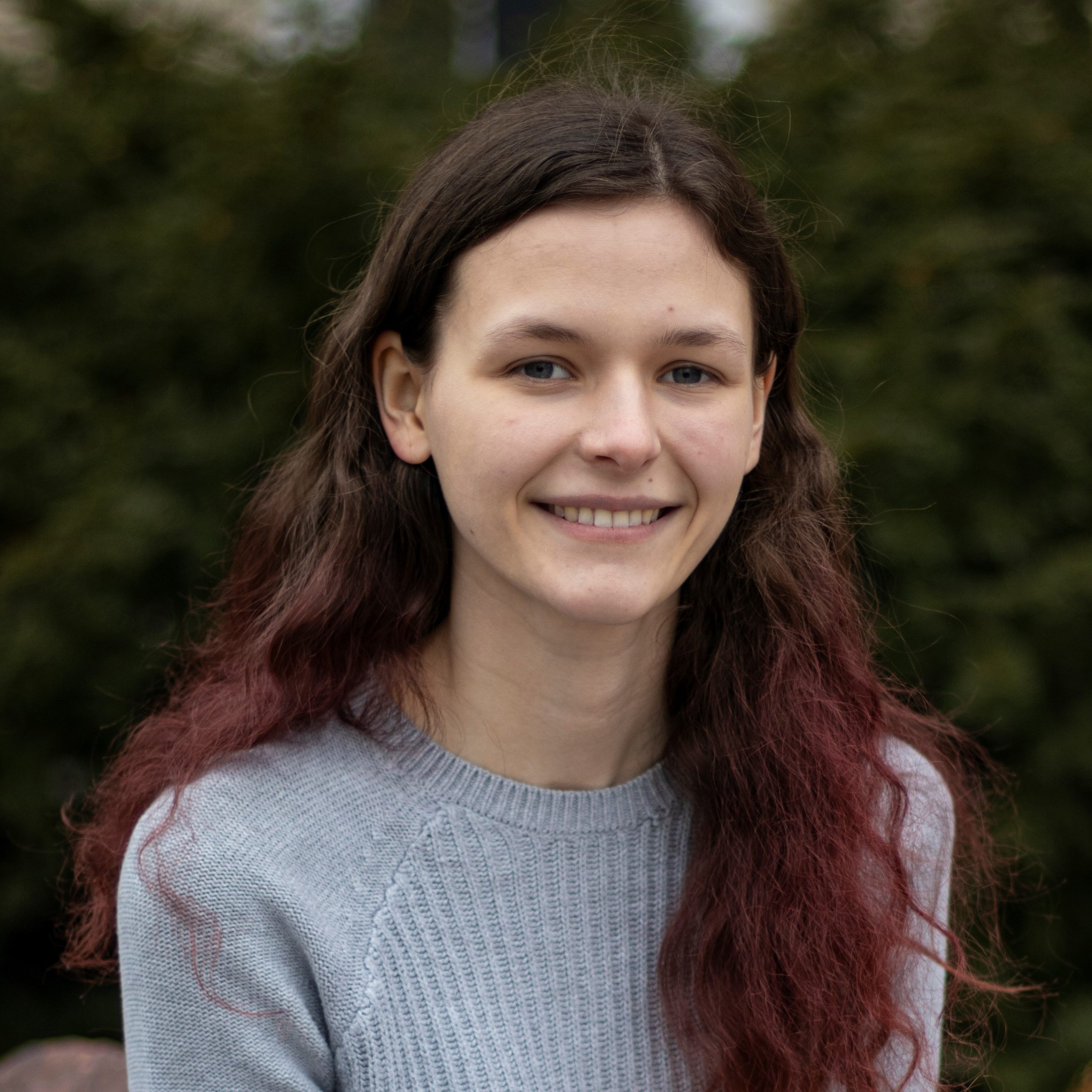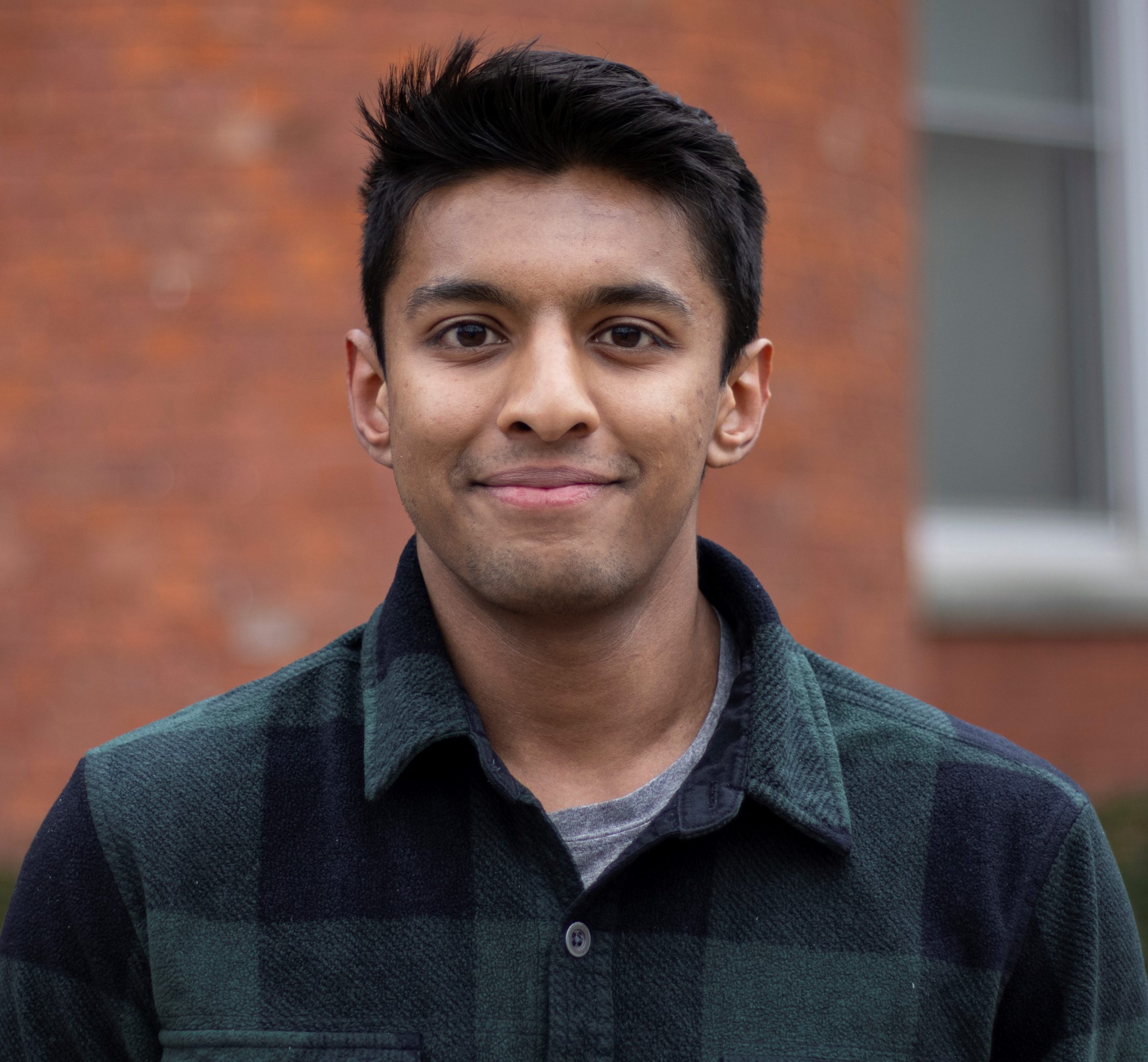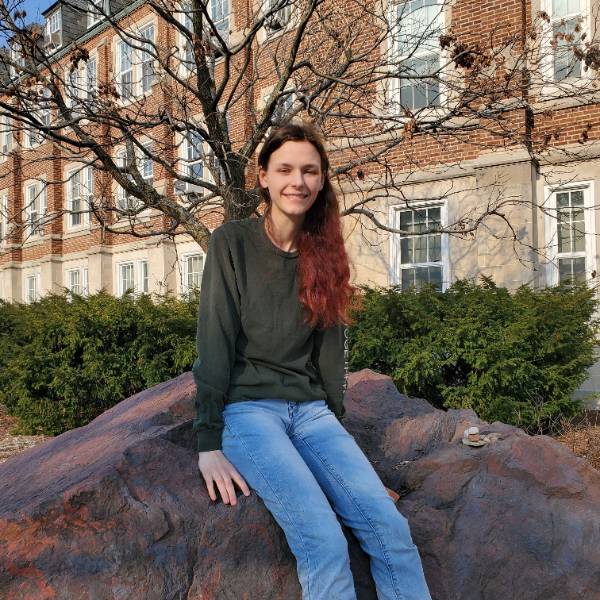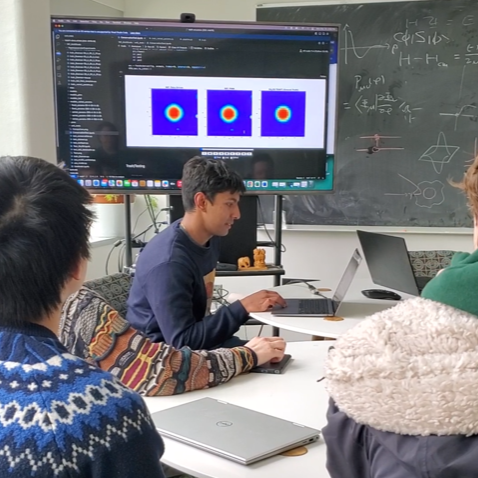Two MSU students earn Goldwater Scholarships
Article Highlights
- Michigan State University students Libby Ashby and Aaron Philip have earned the prestigious Barry M. Goldwater Scholarship, becoming the university’s 54th and 55th Goldwater Scholars.
- Ashby is a third-year student from Michigan studying Geological Sciences and Chemistry in the College of Natural Science.
- Philip is a second-year student from New Mexico studying Physics and Advanced Mathematics in the College of Natural Science.
Michigan State University students Libby Ashby and Aaron Philip have earned the prestigious Barry M. Goldwater Scholarship, becoming the university’s 54th and 55th Goldwater Scholars.
The Goldwater Foundation seeks sophomores and juniors committed to a research career in STEM fields with the potential for significant future contribution in their chosen field. The award provides up to $7,500 per year in funding for undergraduate tuition and living expenses.
For the 2024 Goldwater Scholarship competition, 1,353 outstanding undergraduates were nominated by 446 institutions. Ashby and Philip were among 438 scholars selected. The funding for these awards is a collaboration between the U.S. Congress and the Department of Defense’s National Defense Education Program.

Libby Ashby: Championing Research and Mentorship
Ashby is a third-year student from Hudsonville, Michigan studying Geological Sciences and Chemistry in the College of Natural Science, and is a member of the MSU Honors College.
“Words cannot express my gratitude in being selected as a recipient of the Goldwater Scholarship,” Ashby said. “I am incredibly honored to receive this award, and I am excited to see where my research takes me as I finish my undergraduate studies and transition into graduate school.”
Ashby is committed to a career in geochemistry research, with a focus on metamorphic rocks. She is a research assistant for two projects under the mentorship of Dr. Angela Wilson in the Department of Chemistry and MSU Center for PFAS, and Dr. Tyrone Rooney in the Department of Earth and Environmental Sciences.
"Libby Ashby is a stellar student with an incredible drive towards discovery,” Wilson said. “She has a strong interest in geochemistry/geology and has been a significant contributor to our research endeavors, studying environmental contaminants in soils. We are delighted that she is being recognized for her terrific work and dedication to both academic and research excellence.”
Ashby participated in the university’s Research Experiences for Undergraduates (REU) Program, as well as its High School Honors Science, Math and Engineering Program, mentoring high school students and furthering their education in chemistry and research.
Ashby has also presented research projects at MSU’s Undergraduate Research and Arts Forum, MSU’s Mid-SURE Conference, and the American Chemical Society spring meeting. She currenlty has a manuscript in preparation for publication.
“I would like to acknowledge my research mentors, friends, and family for supporting me both throughout this application process and during my college experience as a whole,” Ashby said. “I owe a great deal of my success to you guys and I truly could not have done it without your support!”

Aaron Philip: A Wide Range of Research Experiences
Philip is a second-year student from Los Alamos, New Mexico studying Physics and Advanced Mathematics in the College of Natural Science, and is a member of the Honors College.
"I am honored and humbled to join the ranks of Spartan Goldwater Scholars. I share this recognition with my professors, research mentors, fellow students, and family who have all supported me and cultivated my passion to pursue a career in physics research,” Philip said. “Specifically, I would like to thank my research mentors over the past few years for their guidance, encouragement, and mentorship: Drs. Pablo Giuliani, Kyle Godbey, Witold Nazarewicz, Odelia Schwartz, Jianliang Qian, and Benjamin Nebgen.”
Philip is passionate about pursuing a career in research addressing micro-scale physics problems using analytic approaches, high performance computing, and Artificial Intelligence. He has contributed to diverse research projects through his roles as a Professorial Assistant at MSU’s Facility for Rare Isotope Beams, a Discovering America researcher with MSU's Math Department, a student intern at the Theoretical Division of Los Alamos National Laboratory, and as a Computer Science REU student at the University of Miami.
“Aaron joined our nuclear theory research group at the Facility for Rare Isotope Beams at Michigan State University in August 2022 as an undergraduate research assistant. An incoming first-year undergraduate student, he came extremely well prepared to directly work in forefront research and quickly managed to get acquainted with the necessary tools and background knowledge,” Dr. Kyle Godbey and Dr. Witold Nazarewicz said.
“During the course of his work, Aaron was able to reach a level of mastery of theoretical and computational methods on par with the current experts in the field. We consider ourselves to be incredibly lucky to have Aaron as a member of our research group and we have no doubt that he will go on to have a successful research career,” Godbey and Nazarewicz said.
Philip has written two papers and presented at various conferences, including MSU's Mathematics and Data Science Conferences, the University of Miami’s Computer Science REU Poster Presentation, and a LANL Lab Directed Research and Development Review.
He also serves as a student tutor through the Mathematics Learning Center and at East Lansing High School.
The Distinguished Student Awards Office, administered by the Honors College, helps undergraduate and graduate students pursue major national and international opportunities by providing information and direct support throughout the competitive application processes.
Interview with Libby Ashby

When did you realize you had a passion for science?
I've pretty much always been broadly interested in STEM fields as a kid. But it wasn't until high school where I'd narrowed down what I actually want to do in my life. You know, it would be more when people would ask me what I wanted to do as a kid. I'd be like, oh, I don't know archaeology or geology or paleontology. And I would just kind of throw a different STEM field around, you know, every time, but it wasn't until I took chemistry that I was like, this is close to what I want to do. I want to do chemistry; then I took a geology class in college. And I was like, I want to do geochemistry specifically.
That's not a path that that's like really talked about in high school science class.
Right. I mean, we had Earth sciences in junior high, but it wasn't that in depth. It was really just, ohh, what are the three rock types? And it was very, very broad. I like when things are a bit more detailed.
Can you talk about your current research project?
I'm actually working in two research groups right now. The first one is with Dr. Angela Wilson and the Chemistry department. And I do computational geochemistry there. So basically, I look at PFAFS (Per- and polyfluoroalkyl substances) and soils. I work running simulations through the Institue of Cyber-Enabled Research (iCER) supercomputers.
Did Dr. Wilson train you how to do the work needed within the lab? It sounds like you need to have a passion for data and computers as well.
Dr. Wilson helped, plus a few other postdocs and graduate students on the research group, it was kind of a group effort, you know, we kind of all help each other there. But, most of the training was teaching me how to code. I can run things independently now and I proposed a project that I'm going to be starting on soon.
You said two, you're doing two different types of research?
My second group is with Dr. Tyrone Rooney in the Earth and Environmental Sciences Department, and for that group I do isotopic analysis on basalts from Kenya. I started on Dr. Wilson's group my freshman year, but a couple of years ago, I thought, OK, well, I have all this computational research experience, but I don't really have any lab. And I want to be equally proficient in lab work. Just to give me the most skill that I can get going into grad school. I joined a second research group because I wanted to build lab skills outside of taking chemistry labs, because that's not the same. I want to experience as much as I can while I'm an undergrad, to be prepared as I can be going into grad school. There's a benefit to having both experiences.
How did you start working in the geology lab?
I had a friend in my major who mentioned that there were openings on this research group because a bunch of seniors just graduated and there were open spots. And I was like, OK, well, I have the time for second research group. I'd like to have this extra experience. So, let's contact people about this! I had an interview with one of the grad students in that group and because I have so much chemistry experience, I was allowed to go and do the isotope work.
How did you know that participating in research was possible?
When I got accepted into the Honors College I got notified of the professorial assistant program. It was, you apply to this, and we'll pay you to do research for ten hours a week and then we'll match you with a professor. And I was like, well, let's see if I can get into this. And I did. And then I requested to do something that was geochemistry, specifically, inorganic chemistry group, where I wouldn't be working with bio stuff. All the groups that people recommended were bio or organic chemistry and that is not my interest by a long shot. I had to very specifically say, don't give me something where I'm working with proteins. I will hate it. I need something where I'm working with geology or something environmental science and chemistry; that's something I'm interested in. Then I was given a list of those types of professors and Dr. Wilson was on that list. Soil science is interesting.
What are the next steps for you?
It doesn't make sense for me to get a Masters because I'm going to have four years of research experience by the time I graduate; I'm going to go straight to a PhD. And my goal is to find a PhD. for something that is geochemistry based, I really want to work with metamorphic rocks.
Do you have any advice for incoming students?
I think it's less of stuff I wish I had known, but more of stuff that I did that happened to be the best decision, you know, but for people that are undecided about what they want to do.
They come in thinking that they're going to be a certain major, but they take one geology class and they're thinking, actually, I like this more. I'd say for people that are undecided, take classes that are not necessarily pre-recs for something but general classes that are a good way to get introduced to a topic without needing to commit to it in a major.
I also feel like people don't realize that they have more time than they think to decide things. People end up switching their majors a couple times and still graduate on time.
For general advice, I'd say an important thing to do in college is networking. People knowing who you are is a significant help. I've won scholarships based on outreach events and volunteering at something. And talking to someone who I didn't know was the person deciding who won a scholarship. But, you know, I made a connection, and they knew me. My name, and my interests. It is important, especially at a big institution like MSU, you can get to know a lot of people and it benefits quickly if you make even a couple positive connections with faculty or people in the department office.
Are you involved in any clubs or outreach efforts right now?
I could talk about geology club. We hang out, sometimes we'll have study nights where we help people with homework that they might be struggling on. Because we have people from a bunch of different majors, we market our club towards everybody. It's a club where anyone who has an interest in rocks can join. That's regardless of how much they know about them. And we're all nerds here, so they'll learn about rocks pretty quickly.
We go on field trips and people get to collect their own rocks. Some localities, where we find the rocks, have been passed down through geology club over the years.
I mean, all our spots are kind of secret. We try not to talk about them too much because if you tell the wrong person in the wrong collecting community, someone will bring in trucks and everything. Michigan State Park rules are that we're allowed to collect rocks from state parks. It just has to be less than 25 pounds per year. That's a lot of rocks, right?
Interview with Aaron Philip
Interview with Aaron Philip

When did you realize that you have a passion for science?
My dad is a mathematician and I'm from Los Alamos, New Mexico, which is the town where they made the atomic bomb. If you've seen Oppenheimer, that's that town. I guess science has been around me for most of my growing up. I've always, you know, I've had a dad that did math. I've lived in different national lab towns and, I always had an interest in math, but when I got to high school, that's when I took a physics course for the first time and math was fun for me, but it wasn't very practical or useful, and when I started taking physics, I like that it was a nice medium between the fun of math and the practicality of something like engineering. I think Richard Feynman, a really famous physicist - those are his words. He tried math and it was too abstract for him and engineering was too practical for him, and physics fell right in between. So I feel like I resonate with that statement a lot.
What skills do you think you've learned during your research journey at MSU?
I think what's very specifically stuck with me through my MSU research experience has been - be collaborative and mentorship focused. I've had the opportunity now to be part of four different research groups and see how they all run and how people choose to run them. This is what really sets apart MSU for me is that focus on building a community. In in my group, my mentors, they've started something called the Advanced Scientific Computing, and Statistics Network, which is this group of people who can contribute to nuclear science, but they don't need to be nuclear physicists and so it kind of lowers the barrier for entry for data scientists, for engineers, for computer scientists, to contribute to research. Being able to do that expands the scope of science for other people. I guess for me, that's been a really big deal. It's something that I personally in future research and when in, well, into the future in my career, I want to have that aspect of personal connection with other people and also in mentoring and, bringing, making science more accessible to other people and their communities. I think I joined MSU in this research group specifically knowing that I'd get to learn from the best physicists and develop as a physicist. But I wasn't quite expecting that aspect of human connection and outreach to be so profound and so important to what people do.
Can you describe your research project?
When experiments are done, we collect information about the nucleus and we try to extract some information. Often we do this by hitting nuclei with things and seeing what comes out and we've learned a lot about the nucleus that way. That process of interpreting experimental results falls to both experimentalists and theorists. Theorists have to come up with models to try to describe what's going on, and that will, in turn, motivate new experiments. There's this theory experiment cycle where each drives the other forward and in order to facilitate that cycle theorists need to be able to use models that are both accurate and fast. You'll be slowing down the process if you have models that take forever to compute, but you'll also you'll have rubbish if your models aren't accurate. And especially in nuclear science experimental errors tend to be much, much smaller than theoretical errors, and so being able to do a task like theoretical model uncertainty where you know just how good or bad your model is, is really important. What I work on is trying to use tools from AI (Artificial Intelligence) to emulate very computationally intensive first-principles theories. I work on developing emulators for traditional time-dependent nuclear theory calculations that trade minimal drops in accuracy for significant speedups in inference. One promising, and crucial, application is for theoretical uncertainty quantification where we need such models when we want to estimate uncertainties in a Bayesian way. This allows us to adaptively calibrate and update our error estimates of parameters as new information/data becomes available as is the case at FRIB.
Who are you working with on your project?
Kyle Godbey is one of my mentors. Another one is Pablo Giuliani. And the third one is Witold Nazarewicz. I'm part of a larger group, the nuclear theory group, and also, the Advanced Scientific Computing and Statistics Network, which connects a lot of both students and the grad schools here, as well as other undergrads in my group. There’s a pretty big community and network going on.
Can you tell us about your internships?
I'll actually be working here (FRIB) this summer with Kyle, Pablo and Witold.
“My very first intern research experience was at Los Alamos National Lab and that
was focused a little broader, in terms of scope. I was in an atomic/molecular theory
group. I said scope, meaning that the physics of electrons and how atoms interact
with
each other is at play at a different scale than the physics of nuclei.
I studied using machine learning to try to generate very realistic reaction paths for a molecule. That is typically a really difficult thing to do efficiently. If you want to use a relatively efficient level of theory based on quantum mechanics built from first principles up, you can use density functional theory (DFT), and that's commonly used by condensed matter physicists. Nuclear physicists have adapted it to their own purposes. Still, it is very computationally intensive to do tasks like reaction path sampling with DFT. Technically what I'm emulating now is that theory’s calculations.
This past summer, I went to the University of Miami and it was a computer science
research internship. I wanted to learn more about these more powerful AI models we're
seeing today. They're much bigger models than I've ever worked with and are being
used a lot
in science. There's kind of some hesitancy to use machine learning (ML) in science
because you want rigorous error bounds on your models. There is error, but there's
a lack of principled ways to classify prediction errors. So, there's a lot of hesitancy
with using
scientific ML, which is really important to think about
I wanted to learn more about these models and to try and think about how to apply them to what I do at MSU. I spent the summer studying specific types of these models that try to classify images. You can pass in an image from 1000 different categories, just a regular picture and currently the state-of-the-art right now can predict which of those 1000 categories with some 90% accuracy. That is a ridiculous task and achievement, and that same type of performative power would be really, really useful in in a context where we have a theoretical physics model with many parameters and we want to perform repeated inference on different combinations of parameters, and there's not a very good or principled way for us to try and explore parameter space. Tools like that could be really powerful and help us speed up these tasks without losing significant accuracy, enabling previously-impossible uncertainty quantification studies
What are your goals beyond graduation?
The intent of the Goldwater Scholarship is that you will go on to pursue a PhD. in a stem field, and so that is my plan as I hope to pursue a PhD. in nuclear physics. On the theoretical side, slash computational side. I've really enjoyed using different computational tools and applying them to physics problems.
Do you have any advice about finding a research opportunity?
What will end up happening is you'll end up cold emailing a lot of professors and a lot of professors are busy and you might not get a response, and that can be discouraging. I had a professorial assistantship coming in, so I knew that I would be able to work with someone, but I didn't know who someone was. When I was reaching out and trying to find out who I would work with, I still didn't get a lot of responses. Witold very graciously responded to me and connected me with Kyle. My point in including that is - you shouldn't be discouraged by lack of responses. There's a lot of professors who do really want to work with you.
We have a big mentorship and collaborative focus and there's a lot of potential to do research on campus here. When I talk to friends that go to other universities it seems like MSU does a really nice job getting their undergrads set up with different research opportunities. So, that would be my advice - persevere with exploring different things that interest you, do your background research about what a professor does. If it sounds interesting to you, try to learn more.
Check out Advanced Scientific Computing, and Statistics Network, whose primary purpose is to foster collaborations and build connections between those
that are pursuing technical developments in computational science, statistics, and
applied mathematics and the various application domains that stand to benefit from
that development.